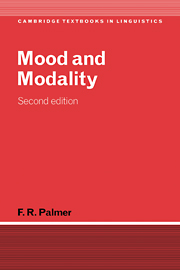Book contents
- Frontmatter
- Contents
- Preface
- Note on the text
- List of abbreviations
- 1 Introduction
- 2 Modal systems: Propositional modality
- 3 Modal systems: Event modality
- 4 Modal systems and modal verbs
- 5 Indicative and subjunctive
- 6 Realis and Irrealis
- 7 Subjunctive and irrealis
- 8 Past tense as modal
- References
- Language index
- General index
Preface
Published online by Cambridge University Press: 05 June 2012
- Frontmatter
- Contents
- Preface
- Note on the text
- List of abbreviations
- 1 Introduction
- 2 Modal systems: Propositional modality
- 3 Modal systems: Event modality
- 4 Modal systems and modal verbs
- 5 Indicative and subjunctive
- 6 Realis and Irrealis
- 7 Subjunctive and irrealis
- 8 Past tense as modal
- References
- Language index
- General index
Summary
Since the publication of the first edition (Palmer 1986) there has been considerable interest in modality (as well as in grammatical typology in general). A symposium on Mood and Modality held in the University of New Mexico in 1992 was successful in bringing together over forty researchers, and resulted in the publication of eighteen papers (Bybee and Fleischmann 1995a). Yet, in contrast, a workshop on modality at the International Congress of Linguists only ten years before had attracted only four scholars. This symposium was followed in 1993 by a symposium on Modality in Germanic languages, which resulted in a further eight papers (Swan and Westvik 1997). Indeed, Bybee and Fleischmann (1995b: 1) suggest that the first symposium succeeded in establishing for modality the kind of status that had been established for tense and aspect by a symposium on those subjects ten years before (Hopper 1982). It should, however, should be pointed out that the first edition of the present volume was published six years before the symposium in New Mexico and that a volume on modality in English appeared thirteen years before that (Palmer 1979).
It was recognized in the first volume that the most appropriate name for the relevant category is simply ‘modality’, and that ‘mood’ is more appropriate as the traditional name for indicative, subjunctive, etc., in both classical and modern European languages.
- Type
- Chapter
- Information
- Mood and Modality , pp. xvPublisher: Cambridge University PressPrint publication year: 2001

